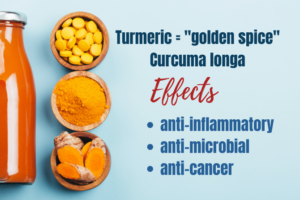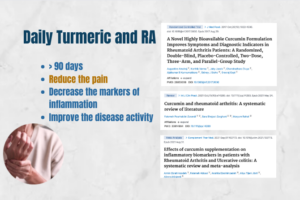SHARE
Many patients with Rheumatoid Arthritis are interested in using turmeric for its anti-inflammatory properties. However, before starting any supplements, I always recommend evaluating the scientific evidence, the benefits, and the associated risks.
In this article, I will discuss
- What is turmeric?
- Is turmeric helpful for rheumatoid arthritis patients?
-
How much turmeric should you use?
This is my third article that includes valuable information about supplements used in patients with arthritis.
In the previous articles, I discussed the scientific evidence for glucosamine, chondroitin, and collagen supplements.
What is turmeric/ curcumin?
Turmeric, also called the ‘golden spice,” is a spice. Turmeric comes from the root of the Curcuma longa plant, a ginger family plant.

Its primary active ingredient is curcumin.
“Curcumin gives turmeric that yellowish, golden color.
For centuries, this spice has been used in Asian cuisine for its antioxidants and anti-inflammatory properties.
Over ten thousand studies have been reported about curcumin’s biological activities, including more than 120 clinical trials.
Is turmeric/curcumin helpful for rheumatoid arthritis?
Rheumatoid arthritis is an autoimmune disease affecting many joints, most frequently hands and feet in a symmetric pattern. Many patients with rheumatoid arthritis without proper treatment will develop pain, swelling and eventually deformities of their joints.

Many animal studies showed the power of curcumin or turmeric to modulate our immune system cells and cells that are part of our cartilage and bones (1). Since these animal studies showed turmeric and curcumin have anti-inflammatory properties, many researchers looked to see if this supplement will help people with rheumatoid arthritis. I selected to present just a few randomized controlled trials and meta-analyses. The results are very promising.
These studies showed that using turmeric daily for at least 90 days,
- will help reduce the pain,
- decrease the markers of inflammation and,
- improve the disease activity (2,3,4)
How much turmeric should be used?
Based on the studies I presented, the turmeric / Curcuma longa extract was 1-2g/ day. An important detail is that your products need to contain black pepper, which will boost curcumin absorption. Some reports suggest turmeric/ curcumin might increase the risk of bleeding, especially in patients on blood thinner medications. I advise careful monitoring of your INR/ clotting tests and frequent monitoring and discussions with your physician.
Before you start any supplement, I advise discussing your clinical situation with a physician that will be able to review your risks and benefits. Supplements can be dangerous in some situations and influence how other medications are absorbed. If you want to learn more about supplements and their scientific evidence, follow my blog posts and my YouTube channel. If you are looking for a consultation for arthritis or autoimmune disease, schedule on our website, Rheumatologist OnCall. We are happy to evaluate and treat you with the most comprehensive approach that will integrate the most cutting-edge science with integrative medicine, including nutrition, supplements, stress management, mindfulness, exercise, and sleep management.
REFERENCES
- Makuch, Sebastian & Więcek, Kamil & Woźniak, Marta. (2021). The Immunomodulatory and Anti-Inflammatory Effect of Curcumin on Immune Cell Populations, Cytokines, and In Vivo Models of Rheumatoid Arthritis. Pharmaceuticals. 14. 309. 10.3390/ph14040309.
- Amalraj A, Varma K, Jacob J, Divya C, Kunnumakkara AB, Stohs SJ, Gopi S. A Novel Highly Bioavailable Curcumin Formulation Improves Symptoms and Diagnostic Indicators in Rheumatoid Arthritis Patients: A Randomized, Double-Blind, Placebo-Controlled, Two-Dose, Three-Arm, and Parallel-Group Study. J Med Food. 2017 Oct;20(10):1022-1030. doi: 10.1089/jmf.2017.3930. Epub 2017 Aug 29. PMID: 28850308.
- Pourhabibi-Zarandi F, Shojaei-Zarghani S, Rafraf M. Curcumin and rheumatoid arthritis: A systematic review of literature. Int J Clin Pract. 2021 Oct;75(10):e14280. doi: 10.1111/ijcp.14280. Epub 2021 May 24. PMID: 33914984.
- Ebrahimzadeh A, Abbasi F, Ebrahimzadeh A, Jibril AT, Milajerdi A. Effects of curcumin supplementation on inflammatory biomarkers in patients with Rheumatoid Arthritis and Ulcerative colitis: A systematic review and meta-analysis. Complement Ther Med. 2021 Sep;61:102773. doi: 10.1016/j.ctim.2021.102773. Epub 2021 Aug 31. PMID: 34478838.














